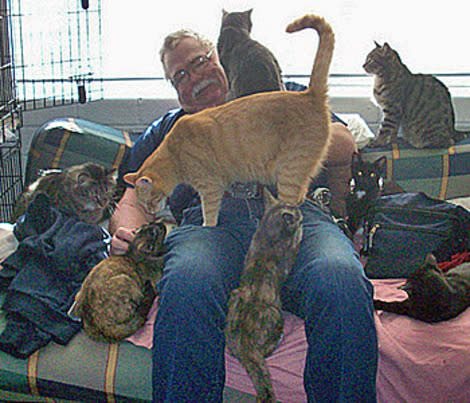How Many Cats is Too Many?

Los Angeles residents may soon be able to own up to five cats.
Under current law, it's illegal to have more than three in a household and people who want to have more felines must obtain a kennel permit.
Councilman Paul Koretz wants to change the city code because he says the cap on cats hurts efforts to get animals off streets and out of shelters.
However, critics worry that increasing the number could lead to disputes among neighbors or even hoarding situation.
Putting a limit on the number of dogs, cats or other pets a household is allowed to keep may seem strange, but such laws are relatively common.
Residents of Omaha, Neb., are allowed up to three dogs and five cats. The people of Pittsburgh can have a maximum of five pets within city limits. In Dallas, the number of cats and dogs depends on the size of the home and surrounding property.
The Rangitikei District of New Zealand recently made international headlines when it passed an ordinance limiting pet owners to three cats. The bylaw was implemented because the council had received numerous complaints concerning noise and odor in the area.
Also see: Why do cats love boxes so much?
Cities and counties are often involved in pet ownership disputes with residents, typically over the number of animals allowed on a property, and local governments must balance animal welfare with residents' freedom to keep pets.
Noise, odor and property damage complaints from disgruntled neighbors are common, and heartbreaking cases of animal hoarding can spark caps on the number of pets allowed within city or county limits.
"Owning animals is one of those things that need codes so that everyone can share a living space," Mike Oswald, director of Animal Services in Multnomah County, Ore., told American City & County. "If you live in a high-density area like New York, you've got to have codes to keep levels even -- noise levels, waste levels, all kinds of levels"
Of course, limiting the number of pets allowed can affect the number cats and dogs in shelters. It can also increase the number of pets that are euthanized.
"The most likely people to adopt additional cats are those who already have cats in their homes," Los Angeles Councilman Paul Koretz said in his motion, noting that allowing residents to adopt more animals would save feline lives.
But one of the biggest issues with limiting a household's number of pets is that such laws are rarely easily enforceable. Not all cities and counties require animals to be registered, and not all laws account for litters of kittens or puppies, or feral populations that may venture onto a person's property.
The New Zealand law states that cats under the age of 3 months won't be affected by the change. However the district's mayor also notes that enforcement will likely be lax.
"We're not going to count people's cats. We don't care how many cats they've got, so long as the cats are happy, the neighbors are happy and everybody else is happy," Mayor Chalky Leary said in a
Still, many animal lovers fight such legislation, arguing that the reasons behind it are misplaced.
"One dog that is irresponsibly owned can be a greater nuisance than five or six dogs who are properly cared for," said Norma Woolf, editor at Canis Major Publications.
Related stories:
